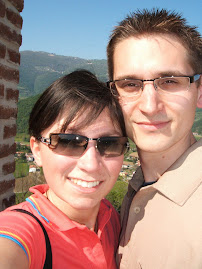 Hi Girls!
Hi Girls!this week Sarah asked us to do something less practical but not less important at all: reflecting about the criteria we use when we have to select among the huge amount of information the web can offer.
Before looking at the websites she suggested, I tried to think to what I usually do to evaluate the reliability of a source. First of all, I judge the layout of the page; even if it can seem a superficial operation, I think the aspect can tell lots of things: from it you can see if it is an "official" site or just a personal page where one simply expresses their opinion; then, if the page is not well organized and confusing, reading and finding useful information become difficult and very time demanding so often is not worth to waste time.
After watching the layout, I try to evaluate the content, in particular the tone and the register: obviously, the more formal they are, the more reliable I consider the source.
But, when I read through the links Sarah put in the post, I realized that my "being critical" was not so complete. :-(
In effect there are many more aspects to be considered. I completely agree with the article of the Purdue’s Online Writing Lab (OWL) when it says "It's been called an art as well as work--much of which is detective work. You have to decide where to look, what clues to search for, and what to accept." As a matter of fact, you have to pay attention to a lot of details in order to judge the source in the most correct way: the first part of the website address, from which you can see if the source is to be trusted; checking if the author is mentioned clearly and with some addresses; look at the date of the last updating; try to understand which is the aim of the article (convince, inform, express a partial point of view).
In order to make this process of selection easier, many sites give the fundamental questions one has to ask him/herself. They are more or less the same, but I found particularly interesting and clear the indications of the Cornell University Library .
I think that all these pieces of advice will be very useful to my thesis work in order not to put unreliable or even false information. It could be a bit time demanding, but it is worth!











4 commenti:
Hi Sara, I hope you've spent a nice weekend! Well, reasoning on Internet sources, I've always tried to judge Web materials looking for some sort of reliability and authority: for instance, I've always tried to understand if the author of that Web page was reputable and reliable by searching the Net for information about him/her. What's more, I've always tried to avoid websites with no updated or current information (a website updated in 2002 is quite old, and thus not really reliable, isnt'it?). Anyway, selecting good materials has still been of some difficulty.. Thus, Sarah's suggestions have proved to be really useful! For instance, I had never carried on an advanced search on Google, specifying the kind of website I was looking for: now I know that, in order to select more authoritative sources, commercial websites (those with a .com address) should be avoided, whereas websites with a .edu address are probably the most reliable source for my academic search. Like you, I totally agree with the Online Writing Lab, which suggests to Web-navigators to make sure what the goals of that website are, as well as the sources of the information it provides. Quite illuminating suggestions, don't y think?
See you in class,
Marta
Hi Sara!
Judging a website by its body and layout is not enough (as I discovered reading the various tips Sarah gave us). However you're not the only one who does this. My first impressions about a site are always influenced by the layout. I look at the colours, the font and its general paging. I know it is a very superficial way of evaluating a site's content but, as I pointed out in my blog, I'm very very lazy and it is easier (but not better) to do this. However I know that for my thesis I'll have to pay more attention to the sources' reliability.
Hi Sara,
I read your post. Don't worry, you aren't the only one who didn't know how to judge a Web source. Like you, I usually judge the layout of the Web page at first. Anyway, I don't think it's completely wrong...As you said, searching for a piece of information can be easier, if the page is well organized. Then, I never considered the update of a page...I've never thought about that, but it's wrong! You need updated and reliable pieces of information to write an academic writing...All the suggestions we read in these websites would help us a lot in writing our final dissertations!
Cheers,
Martina
Hi Sara!
You shouldn't think that judging a website from its layout is completely useless: yes, maybe it's a relatively simple strategy, but, as you and Martina said, the graphics is the first thing that catches your attention. The way a page is organized can tell a lot about its author and the goals it aims at.
The techniques you pointed out are the basic ones to use when you come across new websites, but as we've learnt this week, there's much more to check: the author's reliability, the last update, the ideology which lays underneath the information given in the website and so on. As we said today in class, we can also resort to helpful tools such as specialized search engines (Mamma, GoogleScholar) and social bookmarking (in del.icio.us you can see how many people saved the page you are evaluating among their favorites).
I know, things are getting difficult, but "when the going gets tough, the tough get going"! We have to be accurate to make us sure that our works of research, too, can be considered valuable and reliable!
See you on Wednesday!
Ele
Posta un commento